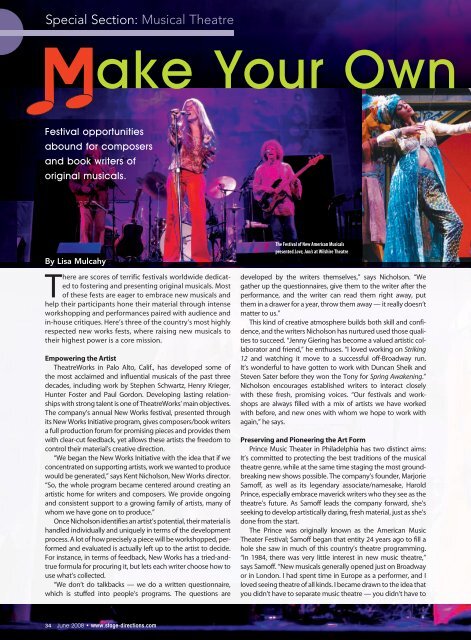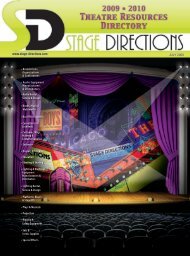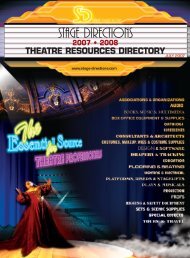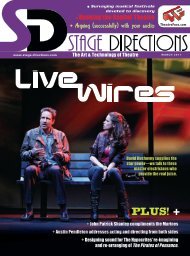Download a PDF - Stage Directions Magazine
Download a PDF - Stage Directions Magazine
Download a PDF - Stage Directions Magazine
- No tags were found...
Create successful ePaper yourself
Turn your PDF publications into a flip-book with our unique Google optimized e-Paper software.
Special Section: Musical Theatreake Your OwnFestival opportunitiesabound for composersand book writers oforiginal musicals.By Lisa MulcahyThere are scores of terrific festivals worldwide dedicatedto fostering and presenting original musicals. Mostof these fests are eager to embrace new musicals andhelp their participants hone their material through intenseworkshopping and performances paired with audience andin-house critiques. Here’s three of the country’s most highlyrespected new works fests, where raising new musicals totheir highest power is a core mission.Empowering the ArtistTheatreWorks in Palo Alto, Calif., has developed some ofthe most acclaimed and influential musicals of the past threedecades, including work by Stephen Schwartz, Henry Krieger,Hunter Foster and Paul Gordon. Developing lasting relationshipswith strong talent is one of TheatreWorks’ main objectives.The company’s annual New Works festival, presented throughits New Works Initiative program, gives composers/book writersa full production forum for promising pieces and provides themwith clear-cut feedback, yet allows these artists the freedom tocontrol their material’s creative direction.“We began the New Works Initiative with the idea that if weconcentrated on supporting artists, work we wanted to producewould be generated,” says Kent Nicholson, New Works director.“So, the whole program became centered around creating anartistic home for writers and composers. We provide ongoingand consistent support to a growing family of artists, many ofwhom we have gone on to produce.”Once Nicholson identifies an artist’s potential, their material ishandled individually and uniquely in terms of the developmentprocess. A lot of how precisely a piece will be workshopped, performedand evaluated is actually left up to the artist to decide.For instance, in terms of feedback, New Works has a tried-andtrueformula for procuring it, but lets each writer choose how touse what’s collected.“We don’t do talkbacks — we do a written questionnaire,which is stuffed into people’s programs. The questions areThe Festival of New American Musicalspresented Love, Janis at Wilshire Theatredeveloped by the writers themselves,” says Nicholson. “Wegather up the questionnaires, give them to the writer after theperformance, and the writer can read them right away, putthem in a drawer for a year, throw them away — it really doesn’tmatter to us.”This kind of creative atmosphere builds both skill and confidence,and the writers Nicholson has nurtured used those qualitiesto succeed. “Jenny Giering has become a valued artistic collaboratorand friend,” he enthuses. “I loved working on Striking12 and watching it move to a successful off-Broadway run.It’s wonderful to have gotten to work with Duncan Sheik andSteven Sater before they won the Tony for Spring Awakening.”Nicholson encourages established writers to interact closelywith these fresh, promising voices. “Our festivals and workshopsare always filled with a mix of artists we have workedwith before, and new ones with whom we hope to work withagain,” he says.Preserving and Pioneering the Art FormPrince Music Theater in Philadelphia has two distinct aims:It’s committed to protecting the best traditions of the musicaltheatre genre, while at the same time staging the most groundbreakingnew shows possible. The company’s founder, MarjorieSamoff, as well as its legendary associate/namesake, HaroldPrince, especially embrace maverick writers who they see as thetheatre’s future. As Samoff leads the company forward, she’sseeking to develop artistically daring, fresh material, just as she’sdone from the start.The Prince was originally known as the American MusicTheater Festival; Samoff began that entity 24 years ago to fill ahole she saw in much of this country’s theatre programming.“In 1984, there was very little interest in new music theatre,”says Samoff. “New musicals generally opened just on Broadwayor in London. I had spent time in Europe as a performer, and Iloved seeing theatre of all kinds. I became drawn to the idea thatyou didn’t have to separate music theatre — you didn’t have to34 June 2008 • www.stage-directions.com
















